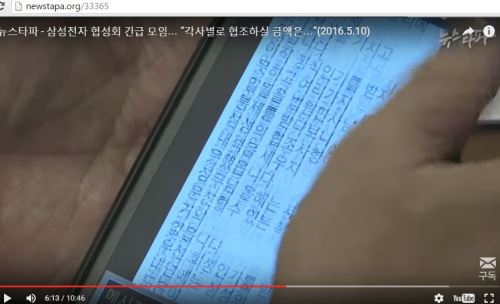
Kwon Jeung-nam, chairman and CEO of Taejung Industries, shows a text message he sent to a Samsung executive, in which he said he could not make an extra payout abruptly imposed on his company by Samsung. Source: Newstapa (YouTube capture)
Samsung Electronics Co., Ltd. extracted at least KRW $20 billion (U$17 million) from a group of component suppliers in fiscal 2014 to prop up the sagging consumer electronics segment, independent news service Newstapa reported May10, citing a whistleblower.
Verbal Request
Two Samsung executives demanded a group of refrigerator and air-conditioner parts suppliers to raise KRW 20 billion for the company in Sept. 2014 when they attended a dinner get-together of the contractors, Kwon Jeung-nam, chairman and CEO of Taejung Industries, the compressor supplier of 28 years for Samsung, told the news cooperative.
There is no paper trail for the request by the two executives, whose identities Newstapa has yet to disclose. “They [the Samsung executives] have never come to a dinner meeting before,” said Mr. Kwon. “The two executives verbally made the request.”
Exceptional Cooperation
However, Samsung’s verbal request is corroborated by a text message the contractors who lead the supplier groupings sent to all members after the dinner, on Sept. 14, 2014.
The carefully worded text message reads: “We are in a position in which we have to reply by today to the collaborative request made by Samsung. We, the [Samsung] partners, all are currently in a difficult and tough situation, but we are at the point needing a resolute decision for a new leap for the consumer electronics segment of [Samsung]. I am asking you for exceptional cooperation.”
On the same day the leading contractors, whom Newstapa has yet to identify, texted another message reading: “Please be advised: the amount assigned to each partner should be paid by year-end.”
“Please Be Generous and Forgive Me”
Samsung’s KRW 20 billion request came down to KRW 100 million (U$85,000) for each of about 20 suppliers. Mr. Kwon refused to pay. Taejung was on the verge of receivership, after years of Samsung’s unilateral cuts in unit prices of compressors.
In a text message to one of the two executives who attended dinner, Mr. Kwon said: “We are in the process of getting court approval for receivership… As many matters are examined by court judges, we could not come around a way to cooperate with you on the collaborative request made by Samsung. There is little room for me to maneuver… Please be generous and forgive me.”
The executive did not reply, and Samsung severed its 28-year ties with Mr. Kwon’s company in 2015. Taejung is now in receivership.
A Tough Year For Samsung
For Samsung, fiscal 2014 ending Dec. 31 was a tough one. Galaxy S5, the then-latest addition to its smartphone line, fell behind Apple’s IPhone and was steadily caught up with by Chinese knock-offs.
That year, the tech giant posted a fall in earnings for the first time in three years. Yearly net profit fell 27 percent to KRW 23.4 trillion (U$21.3 billion) from KRW 30.5 trillion. The fall could have been bigger if it had not been for a 36 percent rise in semiconductor operating earnings.
Air-conditioners and refrigerators are money-losing laggards of Samsung’s diverse product lines; they are buttressed largely by smartphones and memory chips. The company masks the losses by categorizing them into the consumer electronics division, side-by-side with popular digital TVs and monitors.
“The consumer electronics division was under extraordinary pressure because of cumulative losses,” said a former Samsung vendor who, on condition of anonymity, confirmed the attendance by the two executive to the dinner.
Fatal Years For Workers
Samsung’s request, in effect extortion, was in breach of contracts and regulations. It is unclear how Samsung booked these ill-gotten gains in the ledger, casting doubt over its financial integrity. Also, it has yet to be confirmed whether and how Samsung made similar requests to contractors for other Samsung divisions.
What is clear: Samsung’s attempts to slash costs and outsource risk by squeezing suppliers are hurting workers there. In 2013-14, three repairmen who worked separately for Samsung’s after-sale service contractors, died of overwork or committed suicide in protest of harsh working conditions.
Beginning in 2013, dangerous working conditions faced by workers at Samsung’s memory-chip contractors came to light, attracting the notice of activists.
Five workers are now at risk of vision loss, after exposure to high-density gasified methanol at Samsung’s subcontractor, where they cut smartphone clad circuits. The five victims earned KRW 5,700, or U$4.71, an hour while the employers selected methanol over ethanol, which is more hazardous than but half the price, for its production processes.
On Newstapa
Newstapa, founded in 2012 by a small group of investigative TV journalists who were forcedly dismissed for their demand for editorial independence, files and distributes reports via YouTube and local podcasting platforms. It is a form of cooperative run by donations.
As sole Korean part of the Panama Papers Project by the International Consortium of Investigative Journalists, Newstapa recently unearthed shell companies owned by POSCO, South Korea’s steelmaker, and children of the country’s former military dictators.
SHARPS’s Sit-in Continues
Since Oct. 7, 2015, SHARPS and its supporters have been staging a sit-in at Samsung’s corporate headquarters in south Seoul, calling for the world’s largest technology company to: 1) institute a permanent, independently verifiable safety program; 2) compensate all victims of occupational disease transparently and sufficiently; and 3) make a sincere and full apology.


Leave a comment